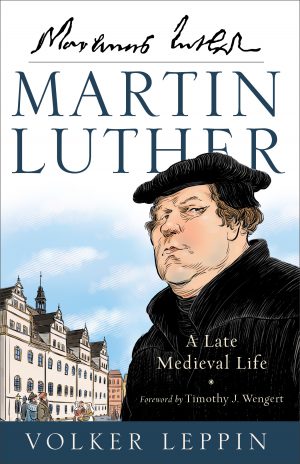For nearly 70 years, English-language readers have been well served by Roland H. Bainton’s classic biography of Martin Luther, Here I Stand. A slew of new biographies has come off the presses in time for the 500th anniversary of the Protestant Reformation, but I still consider Bainton’s the best choice for the general reader, especially if you’re only going to read one book this year about him or the Protestant Reformation.
However, if you’re going to read more than one book, I think you should consider Volker Leppin’s Martin Luther: A Late Medieval Life, translated by Rhys Bezzant. Leppin is professor of church history at the University of Tübingen in Germany, a well-regarded scholar of the late medieval period, and author of a scholarly, German-language biography of Luther, Martin Luther: Gestalten Des Mittelalters Und Der Renaissance (2010), which this much shorter book epitomizes.
Leppin’s biography is a model of economy, clarity, and historical thinking. In his Foreword, Timothy J. Wengert highlights what makes this biography distinctive: “Leppin’s chief contribution to our understanding of Luther stems from his careful distinguishing of Luther’s later accounts of early events in his life from earlier accounts, especially given the influence of the later accounts in relating Luther’s life story.” Wengert also writes that Leppin “demythologizes the standard view of Luther.”
Whether or not you agree with all of Leppin’s demythologizations—and there are ongoing scholarly debates about some of them—it is always helpful, in the pursuit of historical knowledge, to know where the controversies lie.
Book Reviewed
Volker Leppin, Martin Luther: A Late Medieval Life, trans. Rhys Bezzant (Grand Rapids, MI: Baker Academic, 2017).
P.S. If you found my review helpful, please vote “yes” on my Amazon.com review page.

